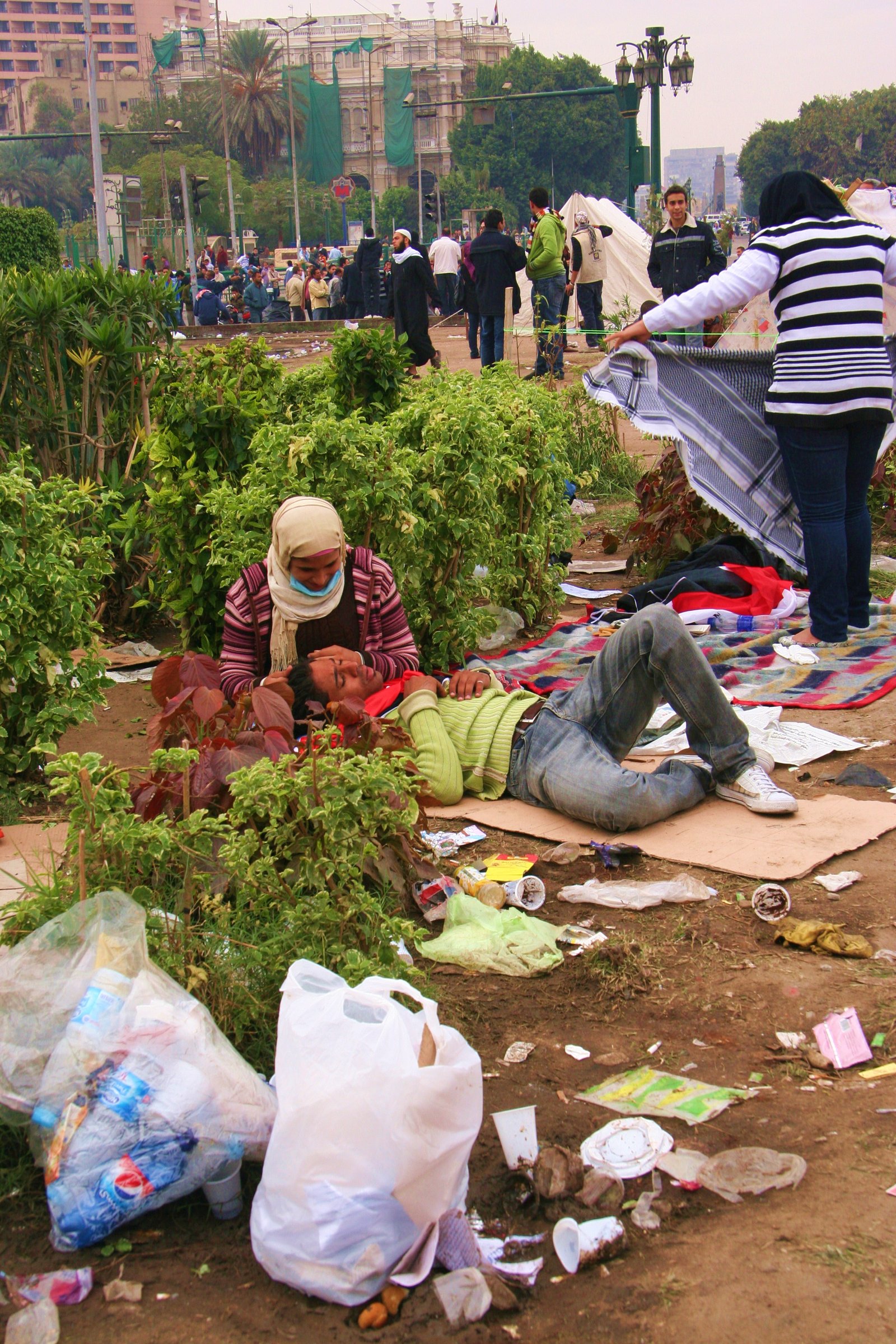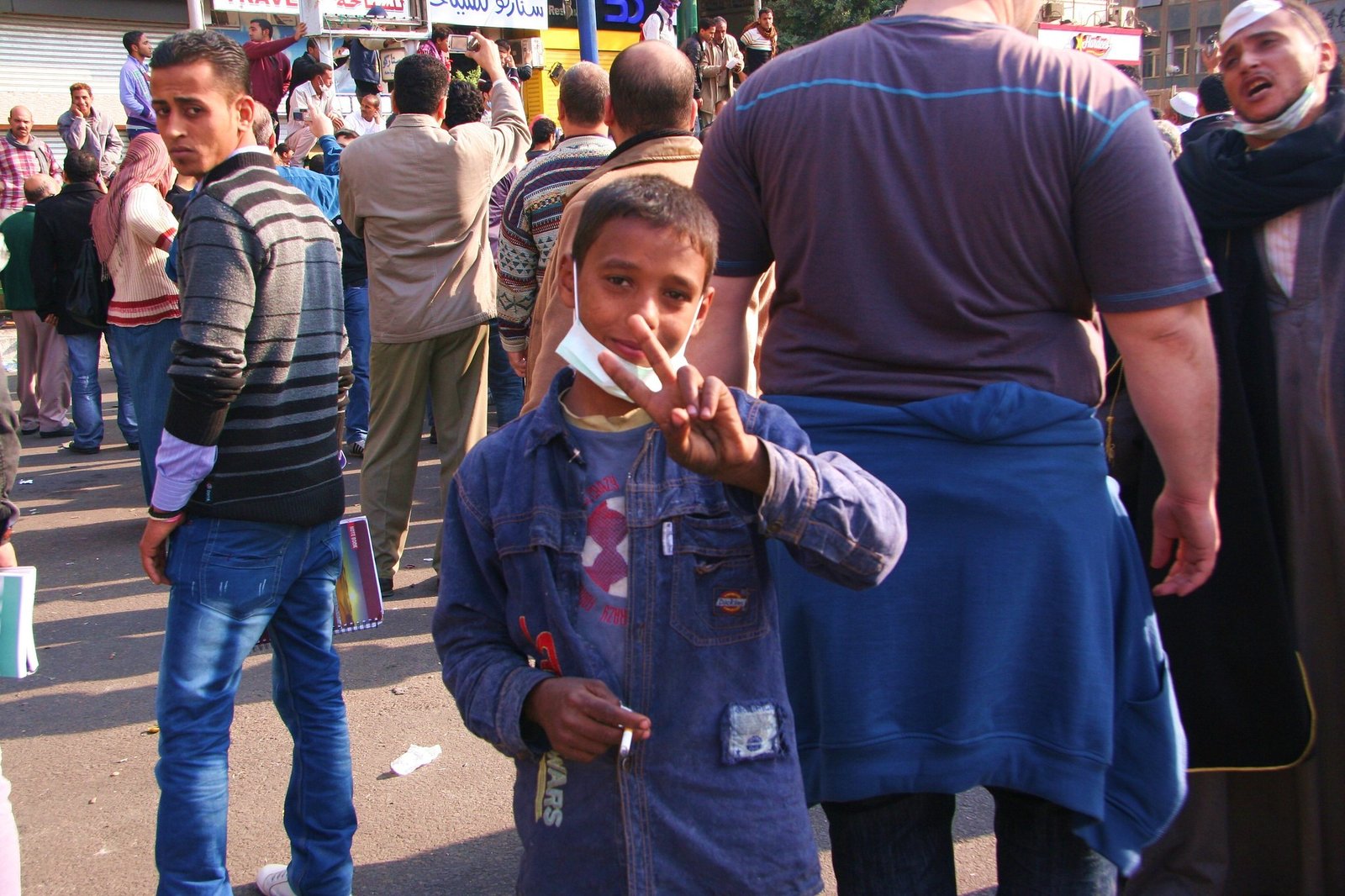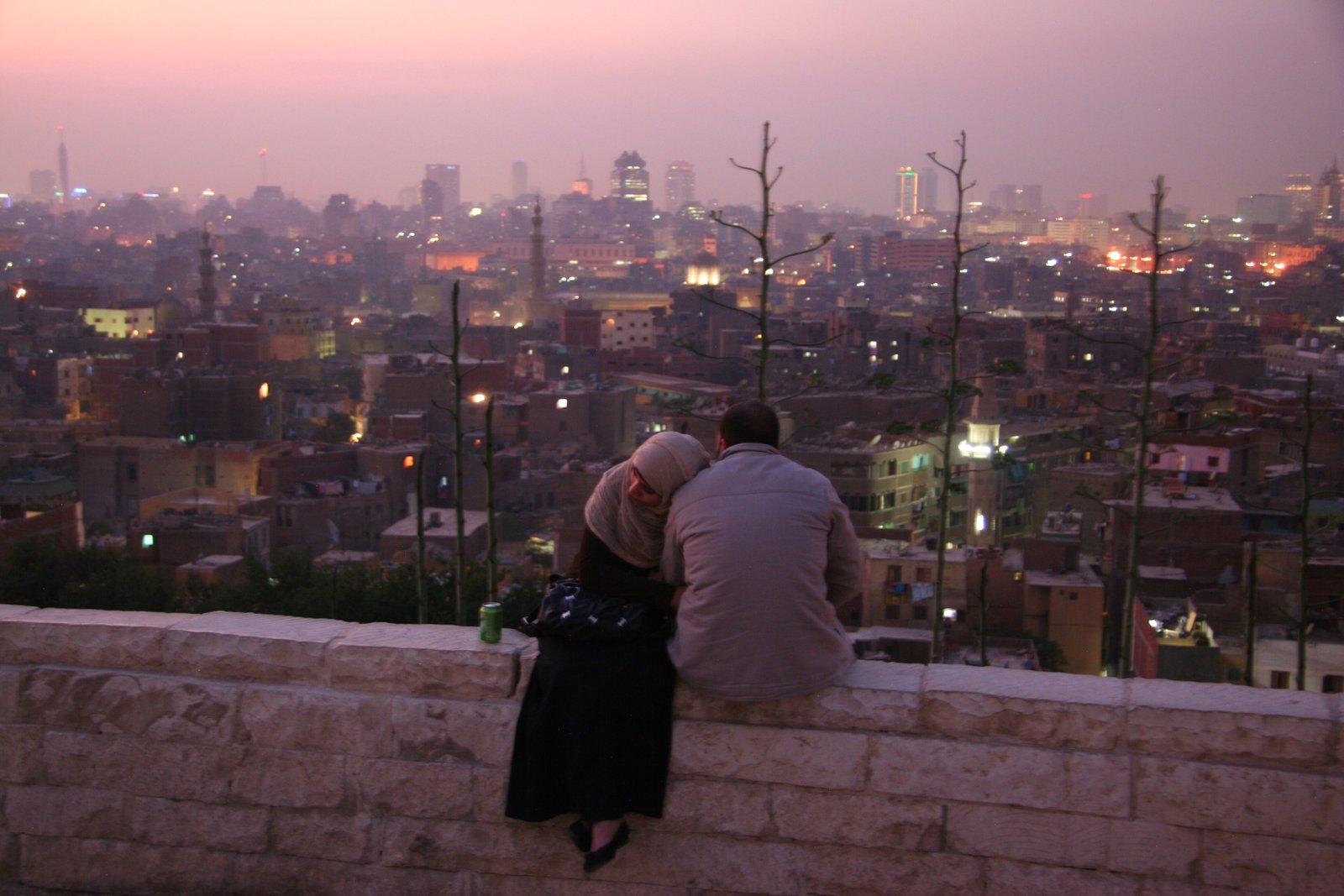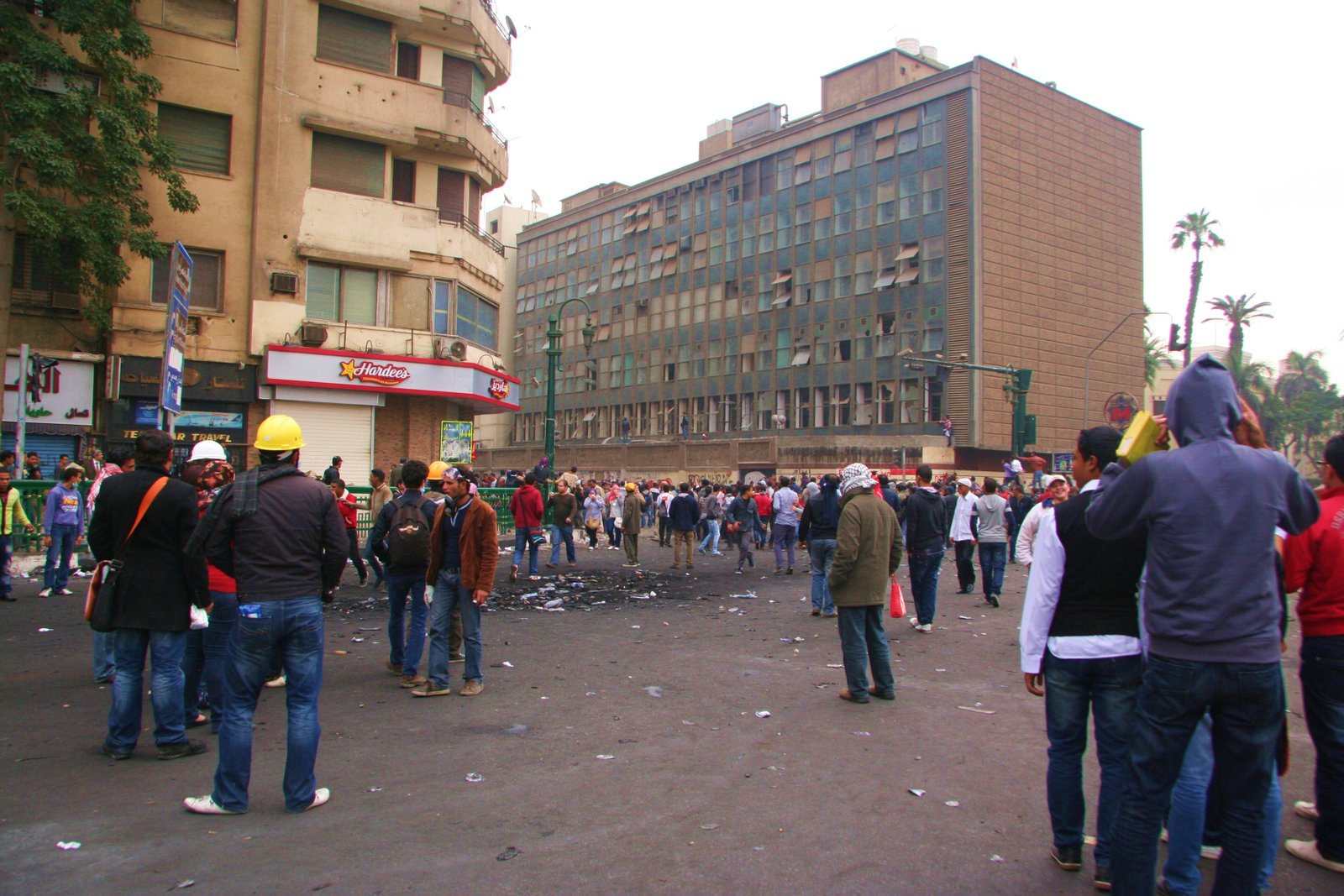“Mohammed! Mohammed! Cairo is burning!”
We are in the middle of the international terminal of the O’Hare airport, staring transfixed at the multiple TV screens showing fire and mayhem on the streets of Cairo. Victor is holding a phone, with the faint voice of Mohammed, our hired Egyptian guide, on the other end telling us not to worry. Behind us, our Cairo flight is boarding.
We had long wanted to go to Egypt. One of our friends, Rita, visited in 2010 and upon coming back told us, “Don’t go to Egypt. Once you go there, nothing else will compare.” We, of course, immediately started planning our trip.
When the revolution erupted in Cairo on January 25, 2011, Victor and I decided to delay our plans to visit. As the 30-year Hosni Mubarak rule came to an end in February and the following months seemed to be devoid of any political turmoil in Egypt, we decided that we were in the clear. We interviewed guides over e-mail, polished our itinerary, worked out all the transportation kinks, and bought airplane tickets for the middle of November. It was now November 18th, and Cairo was burning.
“It’s the upcoming parliamentary elections!” explained Mohammed on the phone, “It’s got everyone on edge!”
“It’s probably just a small skirmish,” we assured ourselves, “It will be over by tomorrow.” And we boarded the plane.
We arrived the next day in the evening, met Mohammed, and went directly to the hostel to sleep off our long flight. Our hostel happened to be a few blocks from Tahrir Square, the same place we watched burning on TV yesterday. The next morning, as we left our hostel, it was nearly impossible to breathe outside. Mohammed immediately covered his mouth with a handkerchief; the air was heavy, full of pollution and residue from last night’s fire. We walked through the streets, teary-eyed, struggling for breath.
It was only as we approached Tahrir Square that the blurry pictures on TV suddenly became a sharply focused reality. While there was no more fire or fighting, and it was eerily quiet, we could see the evidence of last night everywhere. The square was littered with tents, people sleeping on blankets and cardboard, wounded men with bandaged faces with eyes red from tear gas, garbage from dozens of people camping out at the square day and night scattered about. As we tentatively walked through the crowds, we were immediately noticed. Everyone stared curiously at us, a few people nodded or waved, children ran up to pose for pictures. Some people thought that we were Western reporters, asked us to take pictures, and aired their grievances as if we were correspondents for the New York Times.
“Tell everyone what is happening here!” a man with a bloody nose yelled.
What was happening here? Every Egyptian we asked seemed to have a different story. We wanted to know who the protesters were and what they wanted and strangely enough, the next day we met one in our hostel. He was in his early twenties, an Egyptian boy who had immigrated with his family to the U.S. several years before and was currently a first-year law school student in Indiana. He was on a vacation of sorts and was in Egypt after having visited Syria. He took us to his favorite kushari place, a popular Egyptian carb-loaded dish consisting of rice, vermicelli, noodles, lentils, and tomato sauce, and chatted with Victor about law school. As the meal ended, he nonchalantly donned a gas mask and said that he was going to go to Tahrir Square to join the protests. We asked him what the protests were about and trying to accomplish. He said that he just wanted to be a part of the movement. I asked him to be careful, and he shrugged nonchalantly. While he wasn’t an average protester, being young and feeling bulletproof was definitely an integral part of the formula.



We spent much of our time in Cairo trying to figure out what was going on. We talked to our various guides and their friends, we chatted up locals who wanted to practice their English in the park, we listened to fierce political debates in local coffee shops (ahwas) and asked Mohammed to translate. Some thought the protests were out of line, others agreed that enough was enough, and protestors were just trying to make things better. Some people wanted the military to remain in charge, as they brought some order to the country. Others wanted the Muslim Brotherhood to lead the country, while others thought that the organizers of the protests should be the first to attempt to lead this new democracy. And even though no one really knew what was happening or what would happen, there was a feeling of change and excitement in the air. After 30 long years under Mubarak, things were finally changing, and the possibility of a better future was within reach. On the election days, we saw giant lines spanning several blocks of Egyptians waiting to vote and political campaign slogans plastered everywhere. In the middle of the White Desert, we saw Bedouins in tents intensely listening to reports from Cairo on their portable radios, enthusiastically discussing the day’s news among themselves. We couldn’t help but feel that something better was coming for the Egyptian people.
But that first night, as we were resting in our hostel after a long day of sightseeing, 23 people were killed on Tahrir Square as street battles erupted once again. TV screens were once again full of fire and violence, newspaper headlines screamed body counts, and Victor’s Facebook feed erupted with concerned friends and family asking about our whereabouts.
It was so strange, the disconnect between what the media was portraying and what we actually saw on the streets. According to the news feed, the entire Cairo, nay, the entire Egypt from border to border was rocked by protests and violence. In the meantime, just blocks from Tahrir Square, it was impossible to tell that anything was wrong. All the stores were open, and families leisurely strolled the boulevards, men smoked hookahs (shishas) and played dominoes in ahwas, street vendors peddled their wares. One of the few times we were reminded of the ongoing violence was when a taxi driver on the other end of the city refused to drive us to our hostel, citing having to drive too close to Tahrir Square. “It’s crazy there!” he yelled. We took another taxi, and one non-eventful ride later, we were back in our hostel, once again watching newscasters screaming bloody murder from the TV screen. I want to be as clear as I can, recounting these experiences years later. There was horrific violence and death, but as far as we could tell, all the violent protests were limited to one corner of the Tahrir Square, and the rest of the city simply went on with their lives, as usual. This is why, when Mohammed handed me his phone with a panicked German woman on the line, his next client who was having serious doubts about her planned Egyptian vacation, I sincerely told her -” Come! Do not listen to the fearmongering on TV. It is safe here.”

It was a difficult time for Egypt, and we felt deeply for the Egyptian people. The country was almost empty of tourists. The bazaars and markets stood empty of customers, boat captains, and drivers of horse-drawn carriages lined the streets, waiting hopelessly to be hired. Tourism was a major part of the Egyptian economy, and this economy was crumbling before our very eyes.
At the same time, we felt guilty as we richly benefited from this lack of tourists. We were able to spend forty minutes inside the Great Pyramid of Giza completely alone, sitting on the stone floor, our voices echoing through the pyramid. We had the complete run of the world-famous National Museum, gawking at all the treasures a usual tourist needs to stand in long lines to see. We walked through the empty streets of Alexandria, on our way back from a wonderful breakfast and sipping delicious fresh mango juice in to-go cups, our path followed by distrustful gazes of armed soldiers with AK-47s, standing on top of tanks that lined the waterfront of the Mediterranean Sea.
We were foreigners, temporary visitors, tourists, and no matter how much we tried, we couldn’t make much sense of what was happening. In the years since, history has sanitized and categorized the motives, the actions, and the results of everything that happened during that chaotic time. How much of it is true, it’s hard to say. At the time, we could only hope for a better future for Egyptians, and honestly, we still do.
On our way back, we had an eight-hour stopover in Amsterdam. As we wandered the streets, we came upon the “Occupy Wall Street” - a type of protest in a small park with tents strewn all over the place and people sleeping on blankets. One of the large cardboard signs read, “We stand with the people of Egypt!”
“What is happening in Egypt?” I asked a young man sitting near the sign. “What are their protests about?”
He stared at me for a minute and then shrugged.





